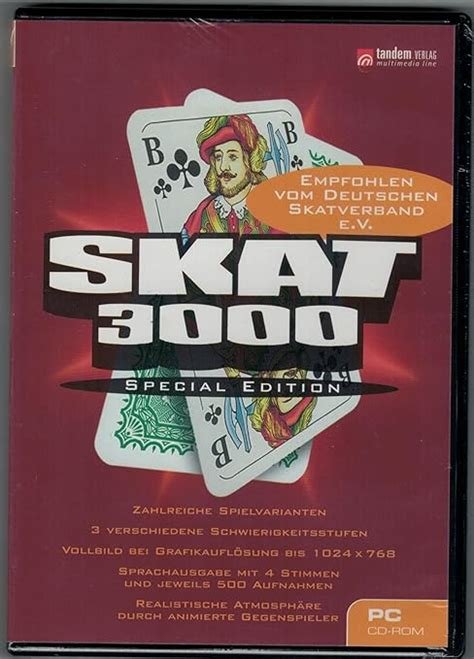- Release Year: 2005
- Platforms: Windows
- Publisher: CreaTeam-Software
- Developer: CreaTeam-Software
- Genre: Card, Strategy, Tactics, Tile game
- Perspective: 1st-person
- Game Mode: Single-player
- Gameplay: Cards, Tiles

Description
Skat 3000: Special Edition is a commercial release of the popular card game Skat, adhering strictly to the official German rules. Developed and published by CreaTeam-Software, this 2005 Windows game was distributed through Aldi supermarkets and offers a first-person perspective on the classic card game, though it lacks the customizable rules of its shareware predecessor.
Skat 3000: Special Edition: A Deep Dive into a Niche Card Gaming Legacy
Introduction
Skat 3000: Special Edition (2005) is a digital adaptation of the classic German card game Skat, a title that occupies a unique niche in the history of video game adaptations of traditional card games. Developed and published by CreaTeam-Software, this game was distributed through the Aldi supermarket chain, making it an unusual case of a retail strategy for a digital card game. Unlike its shareware predecessor, Skat 3000, this version was stripped of its signature feature—freely adjustable rules—restricting players to the official German Skat rules. This review will explore the game’s development, its adherence to tradition, and its place in the broader landscape of card-based video games.
Development History & Context
The Studio Behind the Game
CreaTeam-Software, the developer and publisher of Skat 3000: Special Edition, was a small German studio specializing in card game adaptations. The company had a history of releasing Skat-related titles, including Skat 2095 and Skat!. The decision to release a “Special Edition” through Aldi suggests a strategic pivot toward mass-market accessibility, leveraging the supermarket’s distribution network to reach a broader audience.
Technological Constraints & Gaming Landscape
Released in 2005, Skat 3000: Special Edition was developed for Windows, requiring a modest Intel Pentium processor, 12 MB of RAM, and a CD-ROM drive. This aligns with the hardware capabilities of mid-2000s PCs, ensuring compatibility with a wide range of systems. The game’s first-person perspective and card-based gameplay were not groundbreaking, but they reflected the era’s focus on accessible, turn-based strategy experiences.
A Retail Experiment
The distribution through Aldi was an unconventional move for a digital card game. While Aldi is known for selling physical media, including games, the inclusion of Skat 3000: Special Edition in its lineup was likely an attempt to tap into the German market’s strong cultural affinity for Skat. This retail strategy, however, came at a cost: the removal of customizable rules, which may have alienated players who preferred the flexibility of the original shareware version.
Narrative & Thematic Deep Dive
Unlike many video games, Skat 3000: Special Edition lacks a traditional narrative or thematic depth. Its appeal lies in its faithful recreation of the Skat experience, a trick-taking card game with deep strategic layers. The game’s design is purely functional, focusing on mechanics rather than storytelling. The absence of a narrative is not a shortcoming but rather a deliberate choice, as Skat is inherently a social and strategic game rather than a story-driven one.
Gameplay Mechanics & Systems
Core Gameplay Loop
The game adheres strictly to the official German Skat rules, which involve bidding, trump selection, and trick-taking. Players compete to win tricks and accumulate points based on the cards they capture. The first-person perspective is an unusual choice for a card game, but it adds a layer of immersion by simulating the physical act of playing cards at a table.
UI & Accessibility
The user interface is straightforward, prioritizing clarity over flashiness. Cards are displayed in a traditional layout, and the mouse-driven controls are intuitive. However, the lack of customizable rules—such as those found in the original Skat 3000—limits replayability for players who enjoy experimenting with different rule sets.
Strengths & Flaws
- Strengths: The game excels in its faithful recreation of Skat, offering a pure and unadulterated experience for purists.
- Flaws: The removal of customizable rules and the lack of multiplayer options (as implied by the absence of related features in the description) are notable drawbacks.
World-Building, Art & Sound
Visual Direction
The game’s art style is utilitarian, with a focus on functionality over aesthetics. The card designs are clean and recognizable, and the table environment is simple but effective. The first-person perspective, while novel, does not significantly enhance the experience, as card games are typically played from a top-down view.
Sound Design
Sound design is minimal, with no mention of background music or sound effects in the available sources. This is likely intentional, as Skat is a game of concentration and strategy, where distractions are undesirable.
Reception & Legacy
Critical & Commercial Reception
Skat 3000: Special Edition received little critical attention, likely due to its niche appeal and limited distribution. The lack of reviews on platforms like MobyGames suggests it was not a major commercial success. However, its distribution through Aldi indicates that it reached a segment of the market that might not have otherwise encountered digital Skat.
Influence & Industry Impact
The game’s influence is minimal, as it did not introduce any groundbreaking mechanics or innovations. However, it serves as an interesting case study in the adaptation of traditional card games for digital platforms and the challenges of balancing accessibility with customization.
Conclusion
Skat 3000: Special Edition is a faithful but unremarkable adaptation of the classic German card game. Its decision to restrict players to official rules, while ensuring authenticity, also limits its appeal to those who enjoy rule variations. The game’s retail distribution through Aldi is a fascinating experiment in reaching a broader audience, but it ultimately failed to make a lasting impact. For Skat enthusiasts, it offers a competent digital experience, but for casual gamers, it lacks the depth and flexibility of its predecessors. In the grand tapestry of video game history, Skat 3000: Special Edition remains a footnote—a curious artifact of a time when card games were briefly marketed alongside groceries.